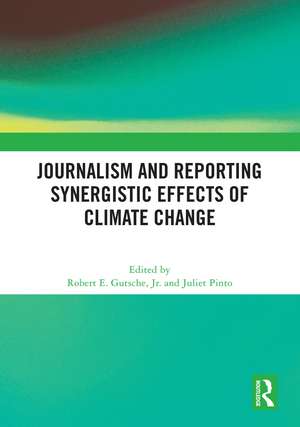Journalism and Reporting Synergistic Effects of Climate Change
Editat de Jr. Robert E. Gutsche, Juliet Pintoen Limba Engleză Hardback – 4 apr 2024
The volume emerges as global communities attempt to address climate events already challenging for journalists to cover and the social and cultural outcomes associated with them. Chapters in this book bring together global scholars and media practitioners who highlight digital challenges in covering the complexities of environmental change, from climate deniers and facts to longstanding and new approaches to covering heat, disaster, safety, mis- and dis-information, and data. These chapters provide conceptual and practical solutions to issues journalists (and scholars) face amidst global contestation and global warming to better communicate in an increasingly digital age.
Journalism and Reporting Synergistic Effects of Climate Change will be an invaluable resource for scholars, researchers and practitioners in journalism, mass communication, media studies, environmental communication, communication studies, and sociology. It was originally published as a special issue of Journalism Practice.
Preț: 1012.34 lei
Preț vechi: 1234.56 lei
-18% Nou
Puncte Express: 1519
Preț estimativ în valută:
193.73€ • 201.11$ • 161.54£
193.73€ • 201.11$ • 161.54£
Carte tipărită la comandă
Livrare economică 24 martie-07 aprilie
Preluare comenzi: 021 569.72.76
Specificații
ISBN-13: 9781032627502
ISBN-10: 1032627506
Pagini: 342
Dimensiuni: 174 x 246 x 21 mm
Greutate: 0.8 kg
Ediția:1
Editura: Taylor & Francis
Colecția Routledge
Locul publicării:Oxford, United Kingdom
ISBN-10: 1032627506
Pagini: 342
Dimensiuni: 174 x 246 x 21 mm
Greutate: 0.8 kg
Ediția:1
Editura: Taylor & Francis
Colecția Routledge
Locul publicării:Oxford, United Kingdom
Public țintă
Postgraduate, Undergraduate Advanced, and Undergraduate CoreCuprins
Introduction—Covering Synergistic Effects of Climate Change: Global Challenges for Journalism 1. New Reasons for Forced Displacement: A Multimodal Discourse Analysis of the Construction of Refugee Identity 2. Precariously Employed Climate Journalists the Challenges of Freelance Climate Journalists in South Asia 3. Calm During the Storm: Micro-Assemblage, Meteorology and Community Building on a Local Independent Weather Blog During Hurricane Harvey 4. Blowing in the Wind—Norwegian Wind Power Photographs in Transition 5. Heroes of the Day After Tomorrow: “The Oil Worker” in Norwegian Climate Coverage 2017–2021 6. The Potential of Interactivity and Gamification Within Immersive Journalism & Interactive Documentary (I-Docs) to Explore Climate Change Literacy and Inoculate Against Misinformation 7. Metajournalistic Discourse as a Stabilizer within the Journalistic Field: Journalistic Practice in the Covid-19 Pandemic 8. How Constructive News Outlets Reported the Synergistic Effects of Climate Change and Covid-19 Through Metaphors 9. Understanding Influences, Misinformation, and Fact-Checking Concerning Climate-Change Journalism in Pakistan 10. Covering the Wildfire of Mati in Greece: Undermining the Systemic Human Impact on the Environment 11. Are Journalists Reporting on the Highest-Impact Climate Solutions? Findings from a Survey of Environmental Journalists 12. Reporting on the 2019 European Heatwaves and Climate Change: Journalists’ Attitudes, Motivations and Role Perceptions 13. Journalists and Engagement on Twitter and Climate Change: Tweet Authors, Formats, and Content During COP25 14. Telling Every Story: Characteristics of Systematic Reporting 15. What is ‘Good’ Climate Journalism? Public Perceptions of Climate Journalism in Denmark 16. Setting an Agenda to Tackle Environmental Issues with Data and Collaboration
Notă biografică
Robert E. Gutsche, Jr. is Associate Professor in the School of Communication and Multimedia Studies at Florida Atlantic University, USA, whose research focuses on issues of power and ideology in digital journalism. He is Associate Editor of Journalism Practice and founded and hosts its podcast, “The J Word.”
Juliet Pinto is Associate Professor in the Bellisario College of Communications at Penn State, USA. Her research explores news production of environmental issues in a comparative perspective. She is the co-editor of the Journal of Environmental Media and the co-editor of the forthcoming volume, Communicating Resiliency and Efficacy in a Digital Age: Mediated Communities.
Juliet Pinto is Associate Professor in the Bellisario College of Communications at Penn State, USA. Her research explores news production of environmental issues in a comparative perspective. She is the co-editor of the Journal of Environmental Media and the co-editor of the forthcoming volume, Communicating Resiliency and Efficacy in a Digital Age: Mediated Communities.
Descriere
This book examines how journalism functions among “synergistic effects” of climate change, such as compounded impact of severe weather, social and political responses to changing global warming, and impacts on our environments.
